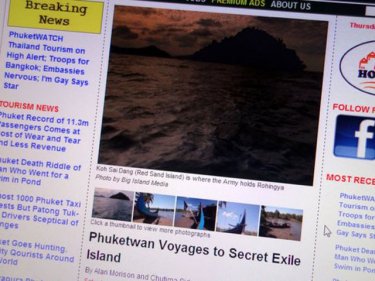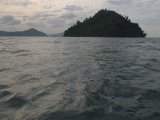Alan Morison, who with reporter Chutima Sidasathian faces a maximum of seven years in jail under ''false and unjust'' charges brought by a Navy captain, was speaking on the anniversary of the publication of the article that revealed the infamous ''pushbacks'' of Rohingya boats from Thailand.
''Five years ago today Phuketwan and later the South China Morning Post exposed how the Thai military was inhumanely mistreating the Rohingya,'' Morison said. ''It seems we have not been forgiven.
''The Navy should cease this attack on free speech and democracy and instead reveal who is inhumanely mistreating the boatpeople today. As a good organisation, they should prevent the trafficking and arrest those responsible for the killings, the rapes and the torture.''
Morison and Khun Chutima won international acclaim and awards for their exposure of the ''pushbacks'' that caused the deaths of hundreds of boatpeople in 2009. As a result of their articles, Thailand abandoned the secret policy.
Today, Morison says, thousands more Rohingya boatpeople are being driven out of Burma (Myanmar) and trafficked through Thailand in an ''exodus of shame'' without the intervention of the Royal Thai Navy or any other arm of the military.
''If the Navy is genuinely worried about its reputation, patrol boats should be apprehending the people traffickers and freeing their human cargoes,'' Morison said.
''The good allied navies of the world fought to end ethnic cleansing 70 years ago. Does the Royal Thai Navy need to be reminded that genocide is a crime against humanity?''
The charges by a captain acting on behalf of the Navy were laid in December over publication of a single paragraph in Phuketwan last July that repeated word for word a paragraph from a Reuters news agency special report.
Quoting directly from the Reuters report, which in turn quoted a smuggler, it reads:
''The Thai naval forces usually earn about 2000 baht per Rohingya for spotting a boat or turning a blind eye, said the smuggler, who works in the southern Thai region of Phang Nga and deals directly with the navy and police.''
The paragraph was translated from the original English into the Thai language and presented to police on Phuket by a representative or representatives from the Royal Thai Navy. Translated back into English, that paragraph reads:
The smuggler who works with Royal Thai Navy and Police in Phang Nga Province said The Royal Thai Navy usually earn about 2,000 Baht per Rohingya for spotting a boat or turn a blind eye.
Morison said today he believed the Navy's use of Thailand's onerous and much-condemned Computer Crimes Act reflected poorly on the service. He said he and Khun Chutima would go to jail rather than seek bail in protest at the attack on media freedom.
''In democracies, the military does not sue the media or threaten jail,'' Morison said. ''The captain could have done the democratic thing and picked up the telephone to call us. The only way the Navy can restore its reputation is by dropping these charges.''
The case is expected to reach court in March or April. A second case is also proceeding against Reuters and two journalists. A vice admiral was quoted on television last week as saying that the journalists should ''justify themselves in court.''
The United Nations human rights chief has called for the charges to be dropped. So have many other international human rights and media rights defenders.
Mr Morison said he believed that criticism of the Royal Thai Navy would grow more intense. ''The military and the media are supposed to be partners in a democracy. If the Navy does not withdraw these charges, Thailand's international reputation could even suffer. ''
United Nations
''Criminal prosecution for defamation has a chilling effect on freedom of the press,'' said Ravina Shamdasani, the spokesperson for the Office of the High Commissioner for Human Rights. ''International standards are clear that imprisonment is never an appropriate penalty for defamation.''
Human Rights Watch
''The Thai navy's lawsuit is a reckless attempt to curtail journalists' reporting on alleged human trafficking by its officers,'' said Brad Adams, Asia director at Human Rights Watch. ''Unless the government withdraws the case, its impact will be felt far beyond those reporting on abuses against the Rohingya - and could have a choking effect on all investigative reporting in Thailand.''
Reporters Without Borders
"It is intolerable that journalists are being prosecuted for just doing their job by relaying information of general interest that had already been made public," Reporters Without Borders said. "Bringing charges under the controversial Computers Crimes Act in a defamation case is indicative of the critical state of freedom of information in Thailand and amounts to an attempt to gag the media. We support these journalists, who are facing a jail term, and we call for the immediate withdrawal of these proceedings."
Committee to Protect Journalists
''Rather than shooting the messenger, the Royal Thai Navy would be better suited launching an internal investigation into the serious allegations of abuse that have been raised,'' said Shawn Crispin, CPJ's senior Southeast Asia representative. ''This type of legal intimidation aims ultimately at discouraging media reporting on allegations of serious human rights abuses.''
Phuketwan
''We wish the Royal Thai Navy would clear its reputation by explaining precisely what is happening to the Rohingya in the Andaman Sea and in Thailand,'' Phuketwan said in a statement released in response to the charges. ''By instead using a controversial law against us, the Navy is, we believe, acting out of character.''
Bangkok Post
The action makes the navy look like a bully, and gives the impression the admirals would like to intimidate the media. Instead of defending the navy's honor, the criminal defamation suit holds it to question. Instead of silencing the media about the story - concerning the navy's role in the mistreatment of Rohingya boatpeople - the lawsuit repeats it, to more people and at greater length.
CNN
Morison said: "The navy's action over one paragraph has created a perfect storm. If the navy proceeds with the case, the Rohingya issue is now tied up in their action against media under a controversial law."
TIME
In the meantime, calmer seas mean that even more Rohingya are expected to attempt the treacherous journey in the weeks ahead. Nothing could gladden the traffickers more.
Reuters
Barb Burg, Reuters' global head of communications: ''Our story was fair and balanced and Reuters has not been accused of criminal libel.''
Bill Barnett (The Phuket Insider)
The issues which have drawn Phuketwan into this fray are profound and disturbing. There should be no need to wax over reality and respect needs to be given to those who stand up for the helpless who cannot help themselves.
Andrew Drummond (Investigative Journalist)
We should all support journalists who are doing a difficult job here under laws which best suit a totalitarian state.




















I hope you go to jail.
You are the least opinionated journalist, I have ever seen. You bash your readers and force your opinion and slant.
You have never stood up for others who have gone through the same or similar situations in their businesses when they are unjustly attacked by officials, forced to pay payouts, etc. I think if you would have used your power to stand up for the little guy and help others you would have more sympathy.
At the very least I hope you are deported soon.
Posted by Justice on January 9, 2014 09:20
Editor Comment:
Hello Justice, happy new year. ''Forced to pay payouts'' . . . oh I see, you want me to stand up for expats on Phuket who choose to make corrupt payments? Sorry, my sympathies are with those who are not easily turned into lawbreakers.